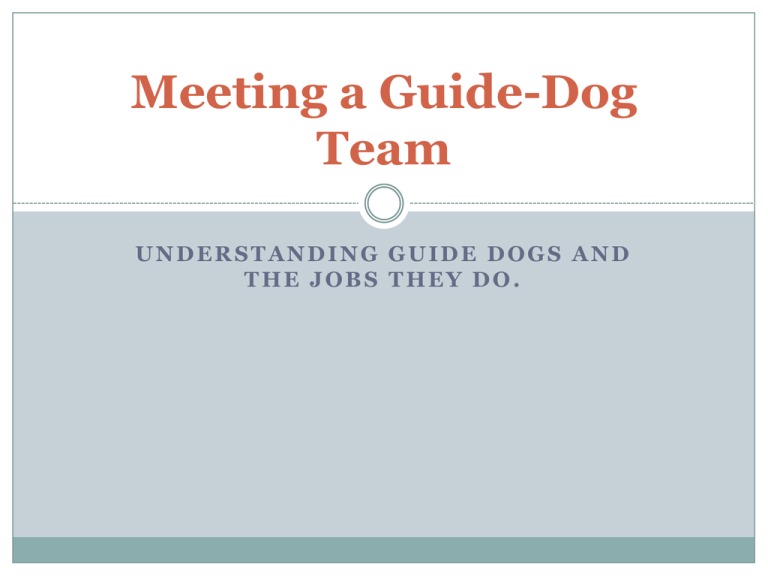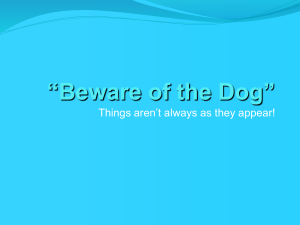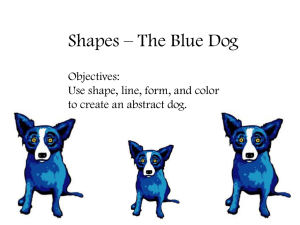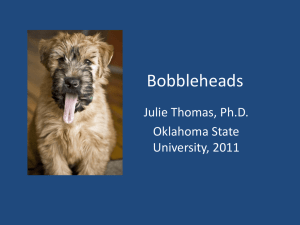Meeting a Guide-Dog Team - Virginia Commonwealth University
advertisement

Meeting a Guide-Dog Team UNDERSTANDING GUIDE DOGS AND THE JOBS THEY DO. Center for Self Advocacy Leadership Partnership for People with Disabilities Virginia Commonwealth University www.VirginiaSelfAdvocacy.org The Partnership for People with Disabilities is a university center for excellence in developmental disabilities at Virginia Commonwealth University. VCU is an equal opportunity/affirmative action university providing access to education and employment without regard to age, race, color, national origin, gender, religion, sexual orientation, veteran’s status, political affiliation or disability. If alternative formats of this document are needed, please contact the Partnership for People with Disabilities at 804/828-3876 or 800/828-1120 (TDD Relay). This project is funded by grant number 90DN0226 from the Administration on Developmental Disabilities, US Department of Health and Human Services. The contents do not necessarily represent the policy of the U.S. Department of Health and Human Services, and you should not infer endorsement by the Federal government. Please include this disclaimer when copying or using all or any part of the materials in dissemination activities. Have you ever met a blind person? How do they get around? Do they fall a lot? Walk into wall? Where do they get those smart dogs? Why cant I pet the pretty dog? These are just a few questions that children ask when they see a person who is blind. I bet a lot of adults wonder too. A guide dog is a highly trained dog that acts as a mobility aid to blind and visually impaired people. It provides not only mobility but gives freedom and independence as well as being a faithful and loving companion How do People get Blind? Some are born that way, other go blind because of a bad accident or illness. Just because a person is blind it does not mean they cannot see anything. Many people who are blind still can see some things, but they need help to get around so they do not fall or get hurt. How do they get around without falling or bumping into things? There are two main ways that a person who is blind gets around. Some use a White Cane Some have Guide Dogs A person who is blind relies on their hearing to help them get around White Cane A white canes is a long white stick that a person swings back and forth on the ground in front of them. They must be trained on how to use a cane by a highly trained person called an Orientation and Mobility Instructor often called O&M instructors Guide Dogs A guide dog is highly trained especially to help a person who is blind or visually impaired to get around. When they are seven weeks old they are sent to live with a family (called Puppy Raisers) that will train the puppy to be comfortable going into all kinds of places, and they learn how to socialize and behave. When they are a year old they are sent to a special school, called a Guide Dog School where they will undergo 5 months of intense training. Once they are finished with their training, they are matched with their new owner who is called a handler. The two of them will go through about 30 days of training and when they are finished they go home and start a new life together. The average working life of a Guide Dog is approximately 8 years. . How Does a Guide Dog Get so Smart? Guide dogs undergo 5 long, hard months of training to take care of getting their handlers where they need to go safely. BUT The handler has to do his job too. A guide dog does not know HOW to get you where you need to go, the handler has to know that. The dogs job is to GET you there safely. Why Can’t I Pet the Pretty Dog? When a guide dog has his special harness on he is working. His #1 job is to take care of his handler. If you pet him or talk to him, or even try to feed him, he forgets he is working and he could hurt his handler. You would not want that to happen would you? Does the Dog Work All the Time? When the dog is home and the handler takes off his special harness, he is just a dog. You can play with him, pet him and hug him, because he is off-duty for the rest of the day, or until his handler needs his help again. Things to Remember When Meeting a Guide Dog Team When meeting someone new who has a guide dog. Ask them if it is OK to pet their dog. Some people do not mind, if they are standing still and the dog is sitting. Some people do not like you to pet their dogs, be respectful. Never offer a guide dog treats, they must stick to a strict schedule, and even a little snack. Can cause problems. Do not call out to a guide dog team from across the street. You will distract the dog and it might forget and run out into the street without looking. Thus putting their handler in harms way. When visiting do not offer the dog toys. They are only allowed to play with certain types of toys. It is not good manners to offer toys without permission of the handler. Before asking questions of a person handling a dog, allow then to complete the task at hand. Remain calm in your approach and mannerism Never tease a dog Have You Ever Heard of People First Language? People first language is where you refer to the person first not their disability. The Blind Woman is The woman with a white cane (or guide dog) The wheelchair bound man is The man who uses a wheelchair







